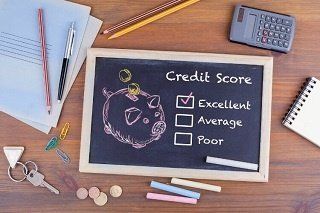Luckily, there are plenty of ways to start building your credit score while you're still studying. None of the tactics below are difficult, but they have the power to set you up for financial success later in life.
Keep reading for five expert credit-building tips.
1. Use a Credit Card Tactically
Did you think that steering clear of credit cards was the best way to build your score? That's a common misconception, and having no credit history can be just as bad as having a poor history, since it gives lenders no clue about the kind of customer you are.
To show that you're a responsible spender, it's smart to use a credit card for small purchases, then pay it off in full each month. Never spend more than you can afford, and avoid credit cards with huge limits that you'll never be able to pay off.
If you're not ready to get a credit card of your own, consider becoming an authorized user on one of your parents' cards. This will help build your score and adds extra motivation not to spend too much.
2. Pay All Bills on Time
Many students get their first experience of independent living at college, and it can be tricky to keep on top of expenses.
However, it's absolutely essential that you always pay your rent and bills on time. Any missed payments will damage your credit score and could come back to haunt you after you graduate.
You should also ensure that roommates are responsible about paying their way. If you're on a joint lease, any payments that they miss will also reflect badly on you. Be wise when choosing who to live with.
3. Keep Details Up to Date
This ties into the previous point -- if you don't keep your address details up to date on all the financial products and services you use, you risk missing important notifications and bills. This can hurt your credit score, and it only takes a second to make sure everything is updated.
Most students move several times during college, so creating a financial checklist to refer to each time you move is a good idea.
4. Avoid Payday Loans
Payday loans are short-term, unregulated loans that can tempt college students who are short on money. However, these loans have huge interest rates and can be detrimental to your credit score if you don't manage to pay them off on time.
Instead of relying on risky loans, take the time to budget correctly and ensure that you're living within your means. If you have to borrow money, consider asking family and friends before turning to high-interest payday loans.
5. Don't Apply for Too Many Credit Products at Once
While using one credit card in a sensible way is good for your credit score, applying for tons of credit products at once can make you look like a risky person to lend to. Avoid applying for any financial products you don't need, and remember that store cards, mobile phone contracts and short-term loans all count as credit products.
Leaving college with bad credit makes it harder to rent, buy a home, consolidate your student loans and borrow money. Plan ahead by taking steps to improve your credit score today, and your future self will thank you.
